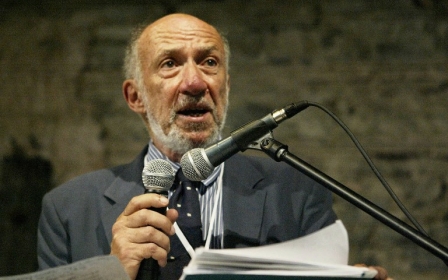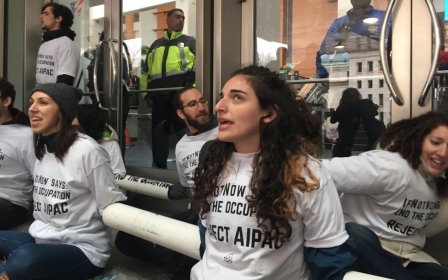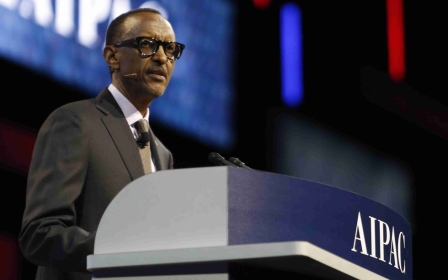AIPAC: Netanyahu pledges to work with Trump on 'peace efforts'
Israeli Prime Minister Benjamin Netanyahu said on Monday he was committed to working with US President Donald Trump to advance peace efforts with the Palestinians and with the broader Arab world.
Netanyahu made the pledge in a speech to the largest US pro-Israel lobbying group at a time when the Trump administration is seeking agreement with his right-wing government on limiting illegal settlement construction on Palestinian land in the West Bank.
But Netanyahu, speaking via satellite link from Jerusalem, avoided any mention of the delicate discussions and stopped short of reiterating a commitment to a two-state solution to the decades-old Israeli-Palestinian conflict.
“Israel's hand and my hand is extended to all of our neighbours in peace,” Netanyahu told the annual convention of the American Israel Public Affairs Committee (AIPAC).
“Israel is committed to working with President Trump to advance peace with the Palestinians and with all our neighbours.”
But he repeated his demand that the Palestinians recognise Israel as a Jewish state, something they have refused to do.
Netanyahu heaped praise on Trump, who has set a more positive tone with Israel than his Democratic predecessor, Barack Obama.
Trump had pledged to move the US embassy to Jerusalem and appointed a pro-settlement envoy to Israel.
The Israeli prime minister thanked the new Republican president for a recent US multi-billion dollar budget request that “leaves military aid to Israel fully funded”.
He also expressed confidence in a US-Israeli partnership for preventing Tehran from developing a nuclear weapon, following its 2015 nuclear deal with world powers, and for “confronting Iran's aggression in the region."
Addressing AIPAC later on Monday, Nikki Haley, the US ambassador to the United Nations, vowed that the Trump administration would watch Iran "like a hawk" to be sure it sticks to the nuclear deal. The accord, which Netanyahu opposed and Trump denounced during his campaign, gave Tehran sanctions relief in return for limits on its nuclear programme.
Last month, Haley blocked the appointment of former Palestinian prime minister Salam Fayyad to be the new UN envoy to Libya simply because he is Palestinian.
"The United States does not currently recognise a Palestinian state or support the signal this appointment would send within the United Nations," she said in a statement then.
On the settlements issue, a round of US-Israeli talks ended last Thursday without agreement. Gaps remain over how far the building restrictions could go, according to people close to the talks.
Netanyahu's coalition is grappling with divisions that have sparked speculation that he could seek early elections.
Many Israelis had expected Trump, because of his pro-Israel campaign rhetoric, to give a green light for settlement expansion in the occupied West Bank. But Trump unexpectedly urged Netanyahu last month to “hold back on settlements for a little bit”.
There is scepticism in the United States and Middle East over the chances for restarting Israeli-Palestinian diplomacy. Peace talks have been frozen since 2014.
Trump has expressed ambivalence about a two-state solution, the mainstay of US policy for the past two decades, but he recently invited Palestinian President Mahmoud Abbas to visit.
New MEE newsletter: Jerusalem Dispatch
Sign up to get the latest insights and analysis on Israel-Palestine, alongside Turkey Unpacked and other MEE newsletters
Middle East Eye delivers independent and unrivalled coverage and analysis of the Middle East, North Africa and beyond. To learn more about republishing this content and the associated fees, please fill out this form. More about MEE can be found here.




